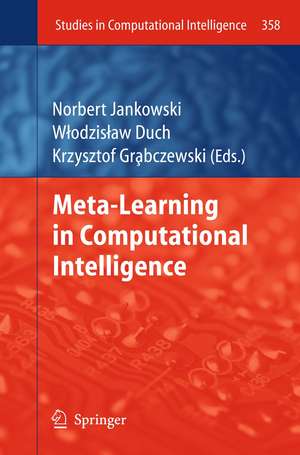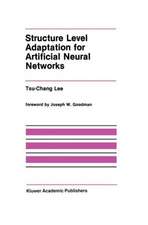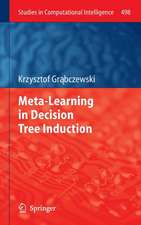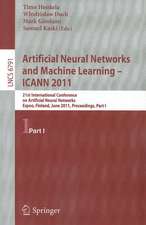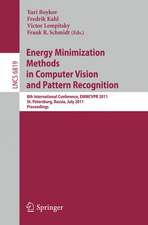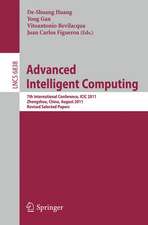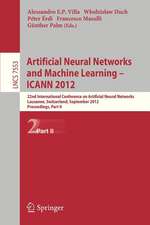Meta-Learning in Computational Intelligence: Studies in Computational Intelligence, cartea 358
Editat de Norbert Jankowski, Włodzisław Duch, Krzysztof Grąbczewskien Limba Engleză Paperback – 3 aug 2013
Modern data mining packages contain numerous modules for data acquisition, pre-processing, feature selection and construction, instance selection, classification, association and approximation methods, optimization techniques, pattern discovery, clusterization, visualization and post-processing. A large data mining package allows for billions of ways in which these modules can be combined. No human expert can claim to explore and understand all possibilities in the knowledge discovery process.
This is where algorithms that learn how to learnl come to rescue.
Operating in the space of all available data transformations and optimization techniques these algorithms use meta-knowledge about learning processes automatically extracted from experience of solving diverse problems. Inferences about transformations useful in different contexts help to construct learning algorithms that can uncover various aspects of knowledge hidden in the data. Meta-learning shifts the focus of the whole CI field from individual learning algorithms to the higher level of learning how to learn.
This book defines and reveals new theoretical and practical trends in meta-learning, inspiring the readers to further research in this exciting field.
| Toate formatele și edițiile | Preț | Express |
|---|---|---|
| Paperback (1) | 1446.66 lei 6-8 săpt. | |
| Springer Berlin, Heidelberg – 3 aug 2013 | 1446.66 lei 6-8 săpt. | |
| Hardback (1) | 1451.12 lei 6-8 săpt. | |
| Springer Berlin, Heidelberg – 10 iun 2011 | 1451.12 lei 6-8 săpt. |
Din seria Studies in Computational Intelligence
- 20%
 Preț: 449.37 lei
Preț: 449.37 lei - 20%
 Preț: 1158.26 lei
Preț: 1158.26 lei - 20%
 Preț: 986.66 lei
Preț: 986.66 lei - 20%
 Preț: 1452.76 lei
Preț: 1452.76 lei - 20%
 Preț: 168.78 lei
Preț: 168.78 lei - 20%
 Preț: 1291.10 lei
Preț: 1291.10 lei - 18%
 Preț: 1112.30 lei
Preț: 1112.30 lei - 20%
 Preț: 565.39 lei
Preț: 565.39 lei - 20%
 Preț: 649.28 lei
Preț: 649.28 lei - 20%
 Preț: 1047.73 lei
Preț: 1047.73 lei - 20%
 Preț: 1578.96 lei
Preț: 1578.96 lei - 20%
 Preț: 643.50 lei
Preț: 643.50 lei - 20%
 Preț: 657.49 lei
Preț: 657.49 lei - 20%
 Preț: 993.28 lei
Preț: 993.28 lei - 20%
 Preț: 990.80 lei
Preț: 990.80 lei - 20%
 Preț: 989.96 lei
Preț: 989.96 lei - 20%
 Preț: 1165.69 lei
Preț: 1165.69 lei - 20%
 Preț: 1444.52 lei
Preț: 1444.52 lei - 20%
 Preț: 1041.96 lei
Preț: 1041.96 lei - 20%
 Preț: 1047.73 lei
Preț: 1047.73 lei - 20%
 Preț: 1046.06 lei
Preț: 1046.06 lei - 18%
 Preț: 2500.50 lei
Preț: 2500.50 lei - 20%
 Preț: 989.13 lei
Preț: 989.13 lei - 20%
 Preț: 1165.69 lei
Preț: 1165.69 lei - 20%
 Preț: 1164.05 lei
Preț: 1164.05 lei - 20%
 Preț: 1042.79 lei
Preț: 1042.79 lei - 20%
 Preț: 1460.19 lei
Preț: 1460.19 lei - 18%
 Preț: 1403.52 lei
Preț: 1403.52 lei - 18%
 Preț: 1124.92 lei
Preț: 1124.92 lei - 20%
 Preț: 1039.47 lei
Preț: 1039.47 lei - 20%
 Preț: 1008.11 lei
Preț: 1008.11 lei - 20%
 Preț: 1045.25 lei
Preț: 1045.25 lei - 20%
 Preț: 1275.42 lei
Preț: 1275.42 lei - 20%
 Preț: 1040.32 lei
Preț: 1040.32 lei - 20%
 Preț: 988.32 lei
Preț: 988.32 lei - 20%
 Preț: 1169.79 lei
Preț: 1169.79 lei - 20%
 Preț: 1162.37 lei
Preț: 1162.37 lei - 20%
 Preț: 1059.26 lei
Preț: 1059.26 lei - 20%
 Preț: 1164.05 lei
Preț: 1164.05 lei - 20%
 Preț: 1166.52 lei
Preț: 1166.52 lei - 20%
 Preț: 1459.38 lei
Preț: 1459.38 lei - 18%
 Preț: 1005.74 lei
Preț: 1005.74 lei - 20%
 Preț: 997.38 lei
Preț: 997.38 lei - 20%
 Preț: 1055.94 lei
Preț: 1055.94 lei - 20%
 Preț: 1284.47 lei
Preț: 1284.47 lei - 20%
 Preț: 994.08 lei
Preț: 994.08 lei - 20%
 Preț: 1048.72 lei
Preț: 1048.72 lei - 20%
 Preț: 1066.02 lei
Preț: 1066.02 lei - 20%
 Preț: 943.78 lei
Preț: 943.78 lei - 20%
 Preț: 1173.10 lei
Preț: 1173.10 lei
Preț: 1446.66 lei
Preț vechi: 1808.32 lei
-20% Nou
Puncte Express: 2170
Preț estimativ în valută:
276.85€ • 300.62$ • 232.55£
276.85€ • 300.62$ • 232.55£
Carte tipărită la comandă
Livrare economică 23 aprilie-07 mai
Preluare comenzi: 021 569.72.76
Specificații
ISBN-13: 9783642268588
ISBN-10: 3642268587
Pagini: 372
Ilustrații: IX, 359 p.
Dimensiuni: 155 x 235 x 20 mm
Greutate: 0.54 kg
Ediția:2011
Editura: Springer Berlin, Heidelberg
Colecția Springer
Seria Studies in Computational Intelligence
Locul publicării:Berlin, Heidelberg, Germany
ISBN-10: 3642268587
Pagini: 372
Ilustrații: IX, 359 p.
Dimensiuni: 155 x 235 x 20 mm
Greutate: 0.54 kg
Ediția:2011
Editura: Springer Berlin, Heidelberg
Colecția Springer
Seria Studies in Computational Intelligence
Locul publicării:Berlin, Heidelberg, Germany
Public țintă
ResearchCuprins
Universal meta-learning
architecture and algorithms.-
Meta-learning of instance
selection for data
summarization.-
Choosing the metric: a simple
model approach.-
Meta-learning Architectures:
Collecting, Organizing and
Exploiting Meta-knowledge.-
Computational intelligence for
meta-learning: a promising
avenue of research.-
Self-organization of supervised
models.-
Selecting Machine Learning
Algorithms Using the Ranking
Meta-Learning Approach.-
A Meta-Model Perspective and
Attribute Grammar Approach to
Facilitating the Development of
Novel Neural Network Models.-
Ontology-Based Meta-Mining
of Knowledge Discovery
Workflows.-
Optimal Support Features for
Meta-learning.
architecture and algorithms.-
Meta-learning of instance
selection for data
summarization.-
Choosing the metric: a simple
model approach.-
Meta-learning Architectures:
Collecting, Organizing and
Exploiting Meta-knowledge.-
Computational intelligence for
meta-learning: a promising
avenue of research.-
Self-organization of supervised
models.-
Selecting Machine Learning
Algorithms Using the Ranking
Meta-Learning Approach.-
A Meta-Model Perspective and
Attribute Grammar Approach to
Facilitating the Development of
Novel Neural Network Models.-
Ontology-Based Meta-Mining
of Knowledge Discovery
Workflows.-
Optimal Support Features for
Meta-learning.
Textul de pe ultima copertă
Computational Intelligence (CI) community has developed hundreds of algorithms for intelligent data analysis, but still many hard problems in computer vision, signal processing or text and multimedia understanding, problems that require deep learning techniques, are open.
Modern data mining packages contain numerous modules for data acquisition, pre-processing, feature selection and construction, instance selection, classification, association and approximation methods, optimization techniques, pattern discovery, clusterization, visualization and post-processing. A large data mining package allows for billions of ways in which these modules can be combined. No human expert can claim to explore and understand all possibilities in the knowledge discovery process.
This is where algorithms that learn how to learnl come to rescue.
Operating in the space of all available data transformations and optimization techniques these algorithms use meta-knowledge about learning processes automatically extracted from experience of solving diverse problems. Inferences about transformations useful in different contexts help to construct learning algorithms that can uncover various aspects of knowledge hidden in the data. Meta-learning shifts the focus of the whole CI field from individual learning algorithms to the higher level of learning how to learn.
This book defines and reveals new theoretical and practical trends in meta-learning, inspiring the readers to further research in this exciting field.
Modern data mining packages contain numerous modules for data acquisition, pre-processing, feature selection and construction, instance selection, classification, association and approximation methods, optimization techniques, pattern discovery, clusterization, visualization and post-processing. A large data mining package allows for billions of ways in which these modules can be combined. No human expert can claim to explore and understand all possibilities in the knowledge discovery process.
This is where algorithms that learn how to learnl come to rescue.
Operating in the space of all available data transformations and optimization techniques these algorithms use meta-knowledge about learning processes automatically extracted from experience of solving diverse problems. Inferences about transformations useful in different contexts help to construct learning algorithms that can uncover various aspects of knowledge hidden in the data. Meta-learning shifts the focus of the whole CI field from individual learning algorithms to the higher level of learning how to learn.
This book defines and reveals new theoretical and practical trends in meta-learning, inspiring the readers to further research in this exciting field.
Caracteristici
Recent research in Meta-learning in computational intelligence Presents new Developments and Trends in Computational Intelligence and Learning Written by leading experts in the field
